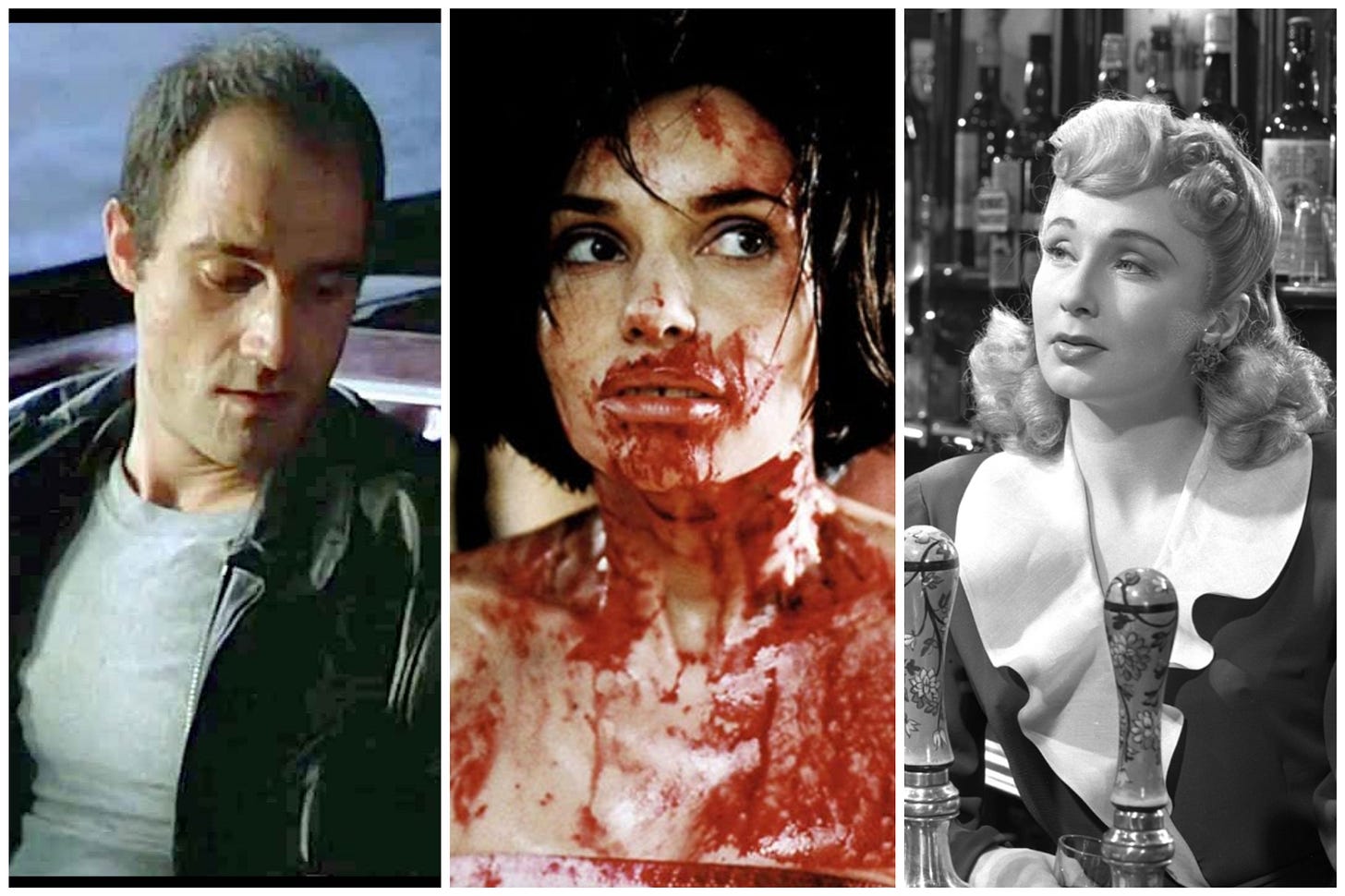Cinema Year '25: September Discoveries
It Always Rains on Sunday / Crash / Trouble Every Day
Welcome back to Cinema Year ‘25, a monthly review supplement. September’s discoveries took us from the rubble of post-blitz London, to Vincent Gallo’s bloodlust, via a car-crash of fetish. Words by Ben Flanagan, Kirsty Asher, and Blaise Radley.
Don’t forget to subscribe to receive this and more film writing direct to your inbox.
Did you attend an interesting repertory film event this month and want to write about it? Get in touch yearzerocinema@gmail.com.
It Always Rains on Sunday (Robert Hamer, 1947, UK)
I spent most of the last month on something of a British post-war cinema kick. This was inspired less by spray painted St George’s crosses than the Locarno Film Festival’s retrospective strand. Friends who attended spoke about the Ehsan Khoshbakht curated selection with hushed rapture. I assumed this survey of national reconstruction 1945-1960 didn’t need a revisit. But this period of cinema shows a shelled-out London that looks how we feel.
This entire cycle of films, usually produced by The Rank Organisation and announced by that terrific gong, shows a unity of thought and sense of national direction in the immediate post-war era. Some may grumble that this system produced no auteurs. How about Muriel Box? Basil Dearden? Alec Guinness flexing his ingenuity? Terence Fisher even got his start with the likes of The Astonished Heart (1950). Across these films, the paranoia of the city is contrasted with the spiritual escapes of The North and Scotland.
It Always Rains On Sunday is a true jewel within this nest of films. Googie Withers brings the grandeur of Anna Magnani in her performance of working class defiance, articulating an extraordinary ability to find the realism within melodrama. She plays an East London housewife (her husband’s second), attempting to nurture her step-children, who runs into crisis when her ex-lover emerges, on the run from Dartmoor. Literally planting himself into the domestic core which is the kitchen, the film’s ticking clock and constantly upending series of circumstances throws symbolism into the kitchen sink.
You’ve seen Rome as photographed by De Sica and Rossellini, but is the miserablism of neo-realism as evocative as the Ealing unit? The way they filmed rubble alongside Victorian architecture weaves something akin to Gothic modernism. Dive into the films from this retrospective, which will surely travel to UK cinemas shortly, and you may never stop plundering the wreckage. BF
Crash (David Cronenberg, 1996, Canada)
Crash is one of those online creatures that endlessly tugs at the uninitiated with its memetics. Identical QTed screenshots of the same final scene, James Spader’s irreverent Cannes press junket: the film about car crash fetishists who dig ever deeper into their obsession has become a placeholder for a type of dirtbag left sentiment which clings to cigarette smoking and laughs in the face of Gen Z anti-sex scene puritanism. And well it might. Its body horror is almost gentle and languorous, frotting against the contemporary tendency toward breathy eroticism in a manner that so badly pissed off early audiences.
Crash may have alienated contemporary audiences, but there is something perversely endearing in witnessing, as with Ducournau’s Titane (2021), the determination to endure pain and body modification in pursuit of actualising one’s desires. This is epitomised in Rosanna Arquette’s Gabrielle manoeuvring her shattered, splinted legs into the right position for a proper fuck with Spader’s Ballard. The urgency with which these people cling to their fetish and the intimacy within allows for an emotional connection. Campion-esque closeups of tender hands probe labial, puckered scars, displacing the unnerving focal point of its purpose.
A nihilistic message about participatory trauma continues to confront how people interact with images of injury and death. Identified at the time as a premonitionary tale, perhaps this film has found its home in an era of unfiltered social media violence. As the conflict between a moral obligation to look away and the desire to lean in closer becomes ever more pronounced in a desperation to preserve moral decency, Crash serves as a reminder of how willfully people choose the latter. KA
Trouble Every Day (Claire Denis, 2001, France)
Trouble Every Day came out at a time when histrionic audience reactions used to mean something—and while there have been plenty of gorier, nastier films in the years since, it’s easy to see why Denis’ use of handheld camerawork, intimate and disorienting, to draw the audience closer to her unflinching depictions of violent sexual assault led to two people fainting and many more booing at its Cannes premiere. As an aesthetic object it is stark, even hostile. And yet despite the lack of footholds it offers viewers—sparse in dialogue, sparer in plot—its approach to refixing folklore and horror as part of a turn-of-the-millenium existential crisis proves hypnotic.
In that regard, it shares a lot in common with Crash (a happy coincidence in the Cinema Year Zero offices this month), another initially underappreciated erotic work by a critical darling that finds people competing with the demons of their sexual urges. But where Cronenberg finds something sterile and nihilistic in the mechanical contrivances of contemporary romance, for Denis, there’s something crueller and more predatory being disguised by simple sexual lusts—the compartmentalisation of which is practically a requisite of polite culture. A disease has taken root and the limb is long since lost, but the body still lumbers on and on. Who better for such disgusting upset than Vincent Gallo. BR



